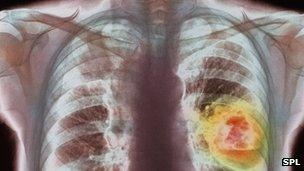Scottish cancer cases increase as survival rates improve
- Published

Lung cancer is the most common form of the disease in Scotland
Cancer cases in Scotland have increased in the last 10 years, but patients are more likely to survive the illness, official statistics have shown.
The number of cases rose from 26,150 in 2001 to 30,125 in 2011.
However, recent statistics showed that the mortality rate fell by 12% over the same period.
Lung cancer remains the most common form of the disease in Scotland, with a stark increase seen among women in the last decade.
Figures from the Information Services Division of NHS Scotland, external said that in the 10 years to 2011 there had been a 20% rise in lung cancer rates for the female population.
It added that to a large extent the figure reflected historic trends in the prevalence of smoking.
Breast cancer remains the most common form of the disease among women with incidence rates continuing to rise. However, the statisticians believed this was partly due to increased detection through the Scottish Breast Screening Programme.
For men, the most common cancer was found in the prostate. Lung cancer was the second most common, but its incidence rate among men had fallen by 14% in the last decade.
Malignant melanoma of the skin was the fifth most common cancer in both men and women. Incidence rates continued to rise significantly, with a steep increase of 58% in men and 46% in women over the last 10 years.
Cancers of the kidney have also shown a significant rise with rates up 28% for men and 52% for women.
Experts said there was no clear reason for the rise, but that obesity and smoking were established risk factors.
NHS Scotland's information division concluded that two in five people would be diagnosed with some form of cancer in their lifetime. However, not all of those diagnoses would have a "detrimental impact on life expectancy".
Health Secretary Alex Neil said: "These figures show that more people in Scotland are getting cancer. However, it is important to note that while cases of cancer have risen, survival rates have increased, and this means more people are living longer after diagnosis.
"We are determined to do more to meet the challenge of rising cancer rates, including that posed by the ageing population.
"We know that more lives can be saved in Scotland through earlier detection, as the earlier a cancer is diagnosed the greater the chance it can be treated successfully.
"People can also reduce their risk of getting cancer by leading a healthier lifestyle.
"Small changes such as stopping smoking, drinking less alcohol, taking regular exercise and eating a healthy diet, including fruit and vegetables, can help reduce the risk of cancer."
Responding to the latest cancer statistics, Scottish Labour's Jackie Baillie said: "The figures show the huge impact cancer will have in every family in Scotland. With almost half of all Scots experiencing cancer at some point in their life, ensuring swift and effective treatment is critical.
"Scottish Labour want to ensure that if someone is suspected of having cancer that they get diagnosed more quickly. We want to see testing and diagnosis within two weeks of someone walking into their GP surgery."
Scottish Liberal Democrat health spokesman Jim Hume said it was encouraging to see that mortality rates for cancer had fallen, but he added that the statistics demonstrated the need for the government and individuals to more to combat cancer.
He added: "The Scottish government must do more to promote healthy lifestyles in Scotland. It is clear that Scotland's relationship with alcohol and food must change if we are to tackle the menace of cancer in our families and communities."
- Published25 September 2012
- Published22 December 2010